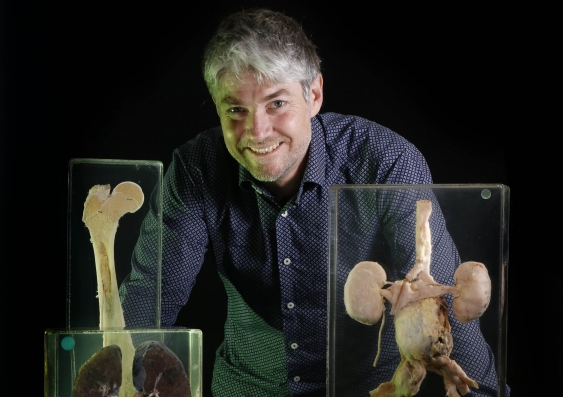Derek Williamson, Museum of Human Disease
Sharing a workplace with 3,000 human tissue samples is both sorrowful and uplifting for this former zoologist, acrobat and now science educator.
Sharing a workplace with 3,000 human tissue samples is both sorrowful and uplifting for this former zoologist, acrobat and now science educator.

I was a nerd, a geek and did well in science but I knew I wasn’t the focused, diligent type of person it takes to study medicine so I enrolled in zoology at the University of Western Australia. I spent my honours year scuba diving around the islands off Perth and studied wallabies on a desert island for 10 weeks.
As a kid I always wanted to be like Harry off the TV show Harry Butler in the Wild. He was an Australian version of David Attenborough. I never got the chance to replace either of them though, they both lived too long.
I trained in a Western Australian circus for six months. I learned trapeze, acrobatics and flame juggling. Sadly, it didn’t lead anywhere. Then I taught high school science on and off for years and travelled the world. Before I came to UNSW I worked as an educator at the Powerhouse Museum.
I’m a keen dancer but not a good one. I love ska music and good tequila, but can’t manage either after midnight these days. I was converted to both when I travelled through Mexico.
The museum can be a sorrowful place because what we display is essentially people’s last experiences, the diseases that ended their lives.
I often get asked what my ‘favourite’ specimen is. We have a seven-year-old boy’s trachea in our collection that I like talking about to high-school students. The boy died from diphtheria in the 1960s. It was the pre-vaccination era and he would have died very painfully, choking to death over a number of days. I have three kids and I’m concerned that as these diseases become less visible, parents are choosing not to vaccinate. Eventually, somewhere, some child will suffer like that little boy did.
The joy for me in this job is showcasing the geniuses we have at UNSW. We have such high-calibre researchers making incredible discoveries; bionic eyes, cochlear implants and sophisticated medical visualisations are all being developed here on campus. Being able to tell visitors to the museum about these breakthroughs is amazing, it’s a privilege.
Working here is a stark reminder of my mortality. I’m more conscious of getting exercise, I bike to work from the inner west and I’m careful about my diet, but sugar’s still my downfall. All the staff here have a pretty dark sense of humour but you need that – if you don’t have humour you’re left with hypochondria.
Last year 10,000 school students came through the museum doors and my hope is that in some way, we encouraged them to make better lifestyle decisions, to be more active. Our children’s generation is the first in the history of the modern world to have a lower life expectancy than the previous generation. I hope we can educate kids about this.